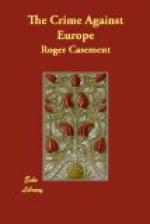Considerations of expediency no less than naval, mercantile, and moral claims would range themselves on the side of Germany and a free Ireland. For a free Ireland, not owned and exploited by England, but appertaining to Europe at large, its ports available in a sense they never can be while under British control for purposes of general navigation and overseas intercourse, would soon become of such first-rank importance in continental affairs as to leave men stupified by the thought that for five hundred years they had allowed one sole member of their community the exclusive use and selfish misappropriation of this, the most favoured of European islands.
Ireland would be freed, not because she deserved or asked for freedom, not because English rule has been a tyranny, a moral failure, a stupidity and sin against the light; not because Germany cared for Ireland, but because her withdrawal from English control appeared to be a very necessary step in international welfare and one very needful to the progress of German and European expansion.
An Ireland released from the jail in which England had confined her would soon become a populous State of possibly 10,000,000 to 12,000,000 people, a commercial asset of Europe in the Atlantic of the utmost general value, one holding an unique position between the Old and New Worlds, and possibly an intellectual and moral asset of no mean importance. This, and more, a sovereign Ireland means to Europe. Above all it means security of transit, equalizing of opportunity, freedom of the seas—an assurance that the great waterways of the ocean should no longer be at the absolute mercy of one member of the European family, and that one the least interested in general European welfare.
The stronger a free Ireland grew the surer would be the guarantee that the role of England “consciously assumed for many years past, to be an absolute and wholly arbitrary judge of war and peace” had gone for ever, and that at last the “balance of power” was kept by fair weight and fair measure and not with loaded scales.
Chapter IV
THE ENEMY OF PEACE
I believe England to be the enemy of European peace, and that until her “mastery of the sea” is overmastered by Europe, there can be no peace upon earth or goodwill among men. Her claim to rule the seas, and the consequences, direct and indirect, that flow from its assertion are the chief factors of international discord that now threaten the peace of the world.
In order to maintain that indefensible claim she is driven to aggression and intrigue in every quarter of the globe; to setting otherwise friendly peoples by the ears; to forming “alliances” and ententes, to dissolving friendships, the aim always being the old one, divide et impera.
The fact that Europe to-day is divided into armed camps is mainly due to English effort to retain that mastery of the sea. It is generally assumed, and the idea is propagated by English agencies, that Europe owes her burden of armaments to the antagonism between France and Germany, to the loss of Alsace-Lorraine by France, and the spirit and hope of a revanche thereby engendered. But this antagonism has long ceased to be the chief factor that moulds European armaments.




